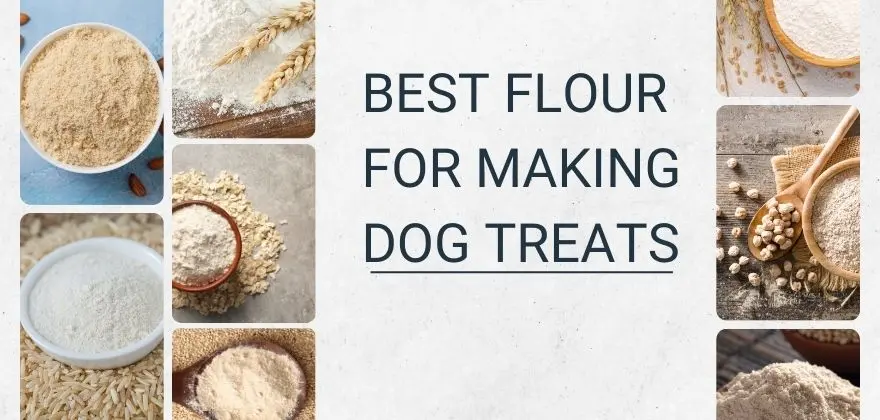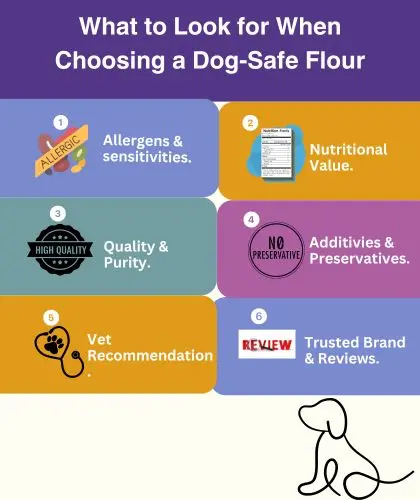The Best Flour For Dog Treats

So, you are thinking of making some fluffy or crispy treats for dogs and looking for healthy dog safe flour options? You should choose it wisely as the flour provides energy, but do you know not all flour is equally nutritious? It can be a burden on small tummies because the way the grains are made can affect how well your canine friend can digest them.
Different flour contains different amounts of gluten, and some dogs are allergic and have sensitivities to it. So, it is not necessary that the most common whole wheat flour that is used in most dog treats can be equally healthy for your dogs, too. Closely monitor your dog and consult your vet before introducing anything new.
What to Look for When Choosing a Dog-Safe Flour:

Types of Flour For Homemade Dog Treats:
Finding the best dog treats flour is difficult because every pet has different nutritional needs. Below are the some best options that you can choose as per your dog’s requirement.
- Oat Flour.
- Almond Flour.
- Rice Flour.
- Whole Wheat Flour.
- Coconut Flour.
- Chickpea Flour.
- Tapioca Flour.
- Sorghum Flour.
- Buckwheat Flour.
- Sweet Potato Flour.
- Quinoa Flour.
- Barley Flour.
Disclaimer: Please consult your veterinarian for your dog’s concerns or questions. The content is provided for informational purposes only and not a replacement for the vet’s advice. It is derived from personal experiences and sources available online.
Is Oat Flour Good For Dogs?
Oat flour is a good choice for your furry friend, especially when they are struggling with weight gain issues. It contains fiber, vitamins, and minerals that keep your pet’s skin healthy and tummy happy, and it may keep the cholesterol level low. Oat flour helps to keep your furry friend full for a long time. Oat flour for dogs is popular with pets who have difficulty tolerating other grains.
Benefits And Risk Of Oat Flour For Dogs.
Fact:
It contains a good amount of fiber that can cause bloating, or gas problems in your pet, so always start with a small quantity with your vet’s advice.
Tip: Use cooked oatmeal for your dogs.
Is Almond Flour Safe For Dogs?
Almond flour is rich in healthy fats, protein, and fiber. It means it contains all the essential nutrients that are required for the overall health of your dog.
It could be a good option for those dogs who have gluten allergies as it does not contain gluten. Almond flour for dogs provides energy levels, maintains a healthy coat, and supports digestion.
Fact:
Almond flour is low in carbs but high in calories, and excessive calories can lead your dog to be round in shape. Another potential drawback is that some pets are sensitive to the nuts, which can lead to adverse reactions.
Brown Rice Flour For Dogs:
Brown rice flour is another gluten-free option for dogs who have gluten allergies and is perfect for savory dog treat recipes. It is a good source of carbohydrates, potassium, minerals, antioxidants, and fiber.
As it is rich in carbohydrates, it is not a good choice for diabetic dogs, and because it is a grain, some dogs may have difficulty digesting brown rice flour.
Fact:
One of the interesting facts is that it helps to calm your pet and may help to fight depression. These little four-legged friends also get depressed, especially when you leave them for a long time.
Can Dogs Have Whole Wheat Flour?
Whole wheat flour is the most common flour that is used by most dogs. It is full of nutrients like Vitamin E and B9, copper, magnesium, iron, fiber, and carbs. It gives a nutty flavor to the dough and a pleasant golden brown color. It is perfect for both sweet and savory dog treats.
Despite the nutritional value and benefits of whole wheat flour for dogs, it is not suitable for all pets because of gluten in it.
Is Coconut Flour Safe For Dogs?
Another nutritious choice for your gluten-intolerant dogs is coconut flour because of its high fiber and healthy fats. It is made from the white part of the coconut (coconut meat) and is low in carbohydrates. It slows down the process of sugar absorption and keeps the blood sugar level low after meals. It provides essential nutrients and is rich in plant-based protein.
Fact: its grainy texture makes it challenging to make a smooth dough due to its high absorbency. Additionally, it is not recommended for dogs with intestinal conditions like IBD or IBS.
Chickpea Flour For Dogs:
Chickpea flour is another treasuring trove of vitamins and minerals that stand out as the most nutrient dense-gluten-free option available.it is a plant-based protein with double protein content in whole wheat flour, rich in fiber and low in carbohydrates.
It also contains vitamins B6 and B9, magnesium, zinc, and potassium, which are necessary to boost your dog’s immune system, energy level, metabolism, and cell division. It makes your dog’s poop less acidic, with less ammonia and dryness.
Fact:
Chickpea flour is bitter in the raw variant, so it might affect the enjoyment of your dog’s meal and raise legume allergies and sensitivities.
Tapioca Flour For Dogs:
Tapioca flour contains digestible carbohydrates with no added sugar and protein. It is highly digestible, which makes it a good option because adverse reactions are usually associated with protein-rich food. Tapioca flour usually maintains proper gut function and alleviates stomach discomfort.
Sorghum Flour:

if your dog likes the sweet and nutty flavor of treats, then there is nothing more appealing than sorghum flour. This meal can enhance the enjoyment of their mealtime. It is an ancient grain derived from the grain of sorghum. This is rich in vitamins, antioxidants, and minerals, but it can give you a tough time as it is gluten-free, so you must add something that will help to hold other ingredients together. Despite its nutritional value, it is not easily available in stores.
Can Dogs Have Buckwheat Flour?
Buckwheat is another gluten-free option that is derived from the seeds of plants originally from Asia. It is rich in antioxidants, fiber, minerals, vitamins, and plant-based protein. The buckwheat flour gives your dog’s snack a nutty and bold taste in both sweet and savory meals. The dark buckwheat flour has a bitter taste, and you need to mix it with other flour like coconut or oat flour. Combining it with light buckwheat can make it taste milder and have a lighter texture.
Due to its unique texture and flavor, your dog may refuse the buckwheat flour.
Sweet Potato Flour:
This is a grain-free option for those dogs who have grain sensitivity. It is packed with vitamins A, B, C6, magnesium, and potassium. It provides a subtle sweetness to the dog’s meal and is a good alternative to artificial sweeteners and sugar.
This grain free flour for dogs is high in carbohydrates, which is why it might not be a good option for dogs with diabetes and obesity.
Quinoa Flour:
It is extracted from the seeds of quinoa. It is low in calories and a good source of magnesium, manganese, phosphorus, copper, folate, iron, and 9 essential amino acids.
However, some experts believe that it is not a good choice for your pets due to the naturally producing chemicals called saponins that can cause gastrointestinal irritation.
Barley Flour:
Barley flour is derived from cleaned barley grain. It is safe if used in moderation. It is low in cholesterol and high in fiber, but since it is a carbohydrate, it should not be the regular part of your dog’s diet even if your dog is getting a protein-rich diet.
Check out healthy Strawberry Yogurt Dog Treats | Easy Recipe
&
Healthy Pumpkin Gelatin Dog Treats
Top Tips for Storing Grain, Nut, and Seed Flours: |
Here is some tips and tricks that will be helpful in storing different types of flour for dog treats. It will also help to extend the shelf life of the flour and maintain the quality of your grain, nuts, and seed-based flour.
|
Please Read a study, how different kinds of starch impact on canines and affect the dog’s digestion, energy level, gut bacteria, and blood sugar level after eating.
What Is The Best Flour To Use For Dog Treats – Final Thought:
I must say there’s no single ‘best’ option when it comes to dog treats. Understanding your dog’s unique nutritional needs is the only way to find out what is best for your dog. Flour that is best suited for your dog is not necessarily equally healthy for another. Some dogs may need more protein, while others might need different nutrients. So, it’s all about finding your dog’s needs with the help of your veterinarian’s advice and choosing the best that support their health.”.



